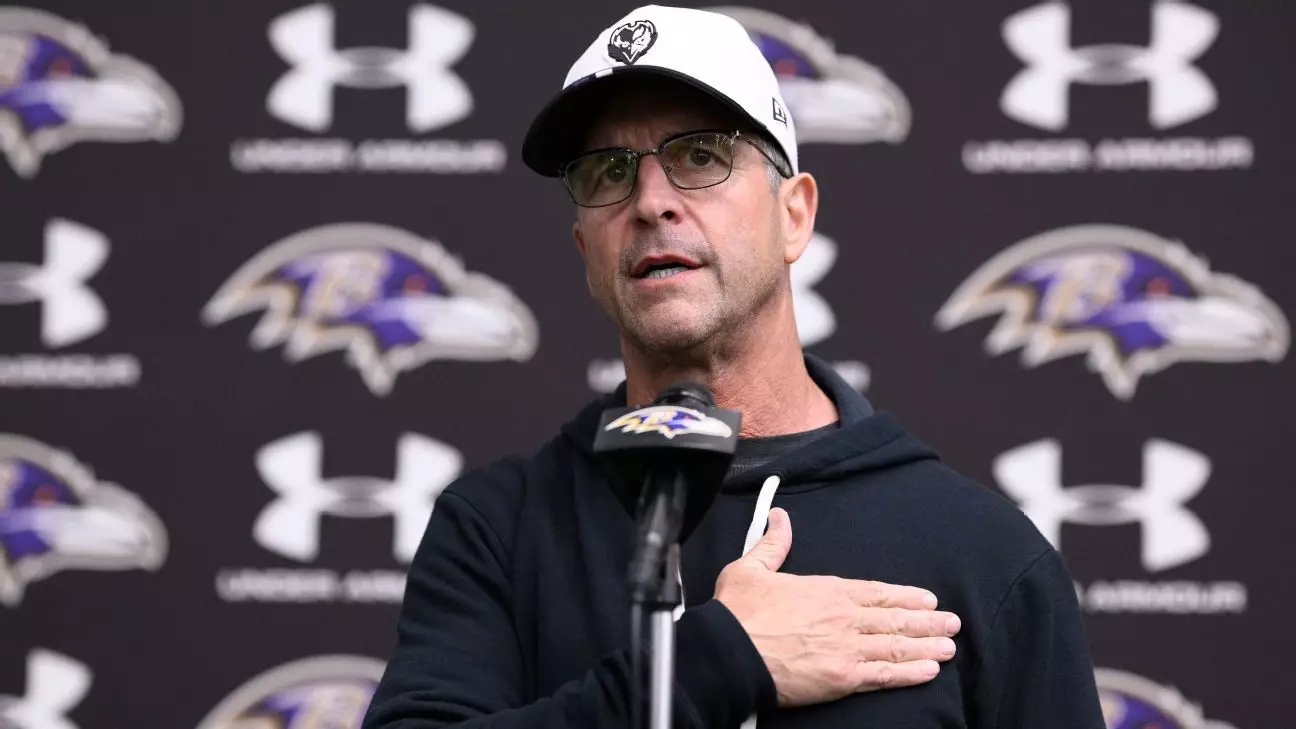In the world of professional sports, the decisions made by teams often ripple far beyond the field. The Baltimore Ravens’ recent choice to release Justin Tucker, touted as the NFL’s most accurate kicker, encapsulates this complexity. Coach John Harbaugh, alongside owner Steve Bisciotti and general manager Eric DeCosta, navigated a labyrinthine decision-making process, one that blended team dynamics, public relations, and impending legal controversies. Released amid an NFL investigation for alleged sexual misconduct, Tucker’s exit represents a pivotal moment not just for the Ravens but also for how organizations balance talent and player integrity against the backdrop of wider societal norms and expectations.
Harbaugh’s candid acknowledgment that the situation was “complex” underscores the multi-dimensional pressures faced by franchise leaders today. Players carry the weight of their actions on and off the field, and when allegations arise, they not only hurt individuals but also the reputation of the team as a whole. Harbaugh articulated a key point: “We have to get our football team ready,” a sentiment that echoes throughout professional sports where performance metrics often supersede moral considerations in the eyes of fans and hierarchies.
The Allegations and the Fallout
The allegations against Tucker involve accusations of misconduct from numerous massage therapists spanning a period from 2012 to 2016. This timeline coincides with the kicker’s early years in the NFL, complicating the narrative surrounding his professional persona. The Ravens’ choice to act preemptively by cutting Tucker just days after selecting a kicker, Tyler Loop, in the draft, further illustrates a shift in their priorities. While Tucker has vehemently denied the accusations, calling them “unequivocally false,” the organization deemed it necessary to distance itself from the turmoil to safeguard team cohesion.
In a league where image is paramount, the Ravens’ decision reflects an anxious balance between maintaining roster depth and fostering a respectful culture. This is not merely about one player but about the broader implications for the franchise’s ethos. The optics of retaining a star player amidst serious allegations could lead to a public relations nightmare, especially for a team that aspires to uphold a championship-level standard both on and off the field.
Football Decisions Under Stress
The term “football decision” emerged as a key phrase during discussions surrounding Tucker’s release. Harbaugh’s attempt to frame the decision in this manner invites scrutiny. If Tucker had not played since January, how could it be classified as a straightforward on-field move? The reality lies in the ambiguous gray areas where sports, morality, and business intersect. The Ravens’ leadership faced numerous factors: Tucker’s declining performance—as evidenced by his worst season yet—and the need for fresh talent to keep up with the evolving nature of competitive play. Even within the framework of pure athletics, the risks associated with relying on a rookie kicker are significant.
The competition now between Loop and his counterpart, John Hoyland, both of whom are less seasoned than Tucker, raises questions about the strategic blueprint the Ravens are adopting. Historically, the team’s reliance on rookie kickers brought rewards; however, this leap of faith carries inherent risks—if one disaster strikes early in the season, will fans remember Tucker’s legacy, or will they raise questions about management’s judgment?
A Shift Toward New Frontiers
As the Ravens navigate their post-Tucker era, several factors loom large in determining the future trajectory. The narrative surrounding Tucker isn’t merely an isolated case of misconduct but part of a broader discourse in sports about accountability, the pressures placed on athletes, and the obligation of teams to uphold certain standards. The leadership’s decisions reflect not only on the individual but also on the institutional responsibility to foster safe environments.
Moreover, the Ravens must also consider how this shift affects their locker room dynamics. Previous seasons have taught us that a cohesive locker room often translates to winning performances on the field. As they look to forge ahead with a fresh lineup, it’s crucial for Harbaugh and his team to instill confidence in their new kickers while ensuring that other players adhere to a shared ethos of professionalism and integrity.
As the Ravens prepare for the upcoming season, the departure of a once-celebrated star sends ripples through a franchise that has built its legacy on resilience and adaptation. The strategic navigation of this significant transition exemplifies the multitude of choices sports franchises must confront—far beyond the statistics and game-day decisions that fans often see. It’s about honoring the past while critically examining the path forward.

